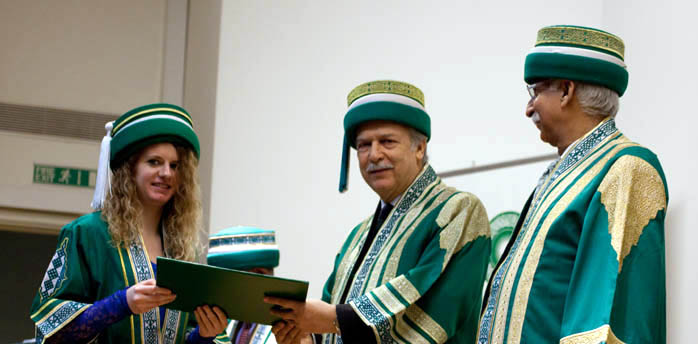Megan's Quest

Without the Institute and its generous scholarship, "I would probably have been a different person," says Megan Wang.
Megan received her Master’s in Muslim Cultures from the Institute for Muslim Civilisations (AKU-ISMC) in 2012. Currently she is part-time coordinating editor for The Middle East in London, a bimonthly magazine published by the London Middle East Institute at School of Oriental and African Studies, University of London.
Megan was born and bred in Highland, a small town about an hour and a half away from New York City – and thousands of miles away from London. In Highland everyone knew everyone else and diversity did not really exist. Megan's quest for knowledge and experience led her to New York University (NYU). Her four-year course at NYU resulted in a double major in International Relations and Middle Eastern and Islamic Studies as well as a minor in Pre-Business Studies.
While at NYU, Megan had an opportunity to spend a semester studying at the American University in Dubai, and it was here that she met a professor who recommended AKU-ISMC to her. The name – ‘Institute for the Study of Muslim Civilisations’, rather than ‘Islamic Civilisation’ appealed greatly to Megan, as she felt the programme would focus on what it means to diverse people, to live as Muslims. This, Megan felt, was amply fulfilled, both in the classes and disciplines on offer, and through her interaction with the international student body.
Megan's most illuminating moment came during the course ‘Muslim Responses to Modernity’. She learned to deconstruct the starting premise of many of the arguments about the incompatibility between Islam and 'modernity'. With this new knowledge, Megan learned to question her own judgements. Today, Megan feels that her problem solving, analytical and research techniques, and her engagement in debates and discussions on a variety of issues have improved. She feels these are transferable skills, valid in many work environments.
Megan comes from a non-religious background and it surprised her how difficult some of the students who come from a more religious background found some of the classes. Like her, they learned to think about and deconstruct where, how and why they had gained the ideas and views they had. Megan sympathised with those who, at times, found the lectures hard to reconcile with their faith. Her admiration for them grew greatly as they came to terms with these new understandings.
At AKU-ISMC, Megan felt she got to know her classmates really well. "Sometimes the most fascinating things you can learn about one another are the little things - the opinions and beliefs about everyday living that make us who we are." Megan feels that the knowledge students have gained about ‘the other’ will ultimately be beneficial to all concerned as it will facilitate better understanding and improved relationships between different cultures.


